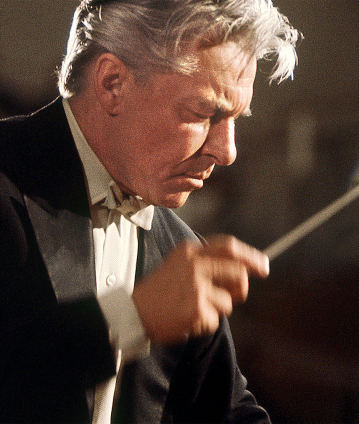Karajan conducts Beethoven, Weber, Rossini and Wagner

Herbert von Karajan laid the foundation of his career as an opera conductor. His fine dramatic instinct manifests itself impressively in this programme with overtures to stage works by Ludwig van Beethoven, Carl Maria von Weber, Gioacchino Rossini and Richard Wagner, which often – such as in the case of the preludes to Tannhäuser and Der Freischütz – come across like condensed versions of the respective full works.
This recording from January 1975, made in front of an invited audience, is one of the most memorable video documents of the Berliner Philharmoniker under Herbert von Karajan. He was essentially a man of the theatre and all five pieces recorded here are of theatre music. Prior to 1967, when he invited the Berliner Philharmoniker to take up a permanent residency at the Salzburg Easter Festival, the orchestra had never been a “pit” band. Over the next 21 years they played in productions of 19 operas by Wagner, Verdi, Beethoven, Strauss and Puccini, all staged and conducted by Karajan.
Karajan never conducted Rossini’s Guillaume Tell in the theatre but its overture – more a four-movement tone-poem than a conventional curtain-raiser – always held a special fascination for him. The opening colloquy for five solo cellos suggested to Berlioz the calm of profound solitude among the mountains when the elements and human passions are at rest. Karajan chose this as the rehearsal piece for his graduation exam in Vienna in 1928, working intently on the cello-led opening pages and making the trumpets rehearse individually so as to ensure absolute accuracy of rhythm in the overture’s celebrated conclusion.
Karajan did conduct Wagner’s Tannhäuser in the theatre, though he left no complete recording of it. This filmed performance of the overture glows white in the furnace almost of its own volition – always for Karajan the sign of a truly great orchestra at work. Not that he lessens his own involvement. “In performance an unbelievable power and tension radiated from him,” recalled one player who had observed him at close quarters for many decades. “So tense were his muscles, he often suffered painful cramps in his left hand which he overcame with great difficulty. He never spared himself when standing on the rostrum.”
© 1975 Unitel
Artists
Our recommendations
- Karajan conducts Beethoven’s “Missa solemnis” in Salzburg
- Herbert von Karajan and Evgeny Kissin at the 1988 New Year’s Eve Concert
- Karajan conducts Beethoven’s Symphonies Nos. 3 & 7
- Karajan conducts Brahms’s Symphonies Nos. 1–4
- Karajan conducts Beethoven’s Ninth Symphony at the 1977 New Year’s Eve Concert
- Karajan conducts Beethoven’s Symphony No. 5